“Being disabled is such a downer”
Says one of the six students with a diagnosis or disability that Omnibus has met. Despite anorexia, depression, schizophrenia, dyslexia, Asperger’s, and muscular dystrophy, all six study at AU and receive help and support from AU's Counselling and Support Centre.
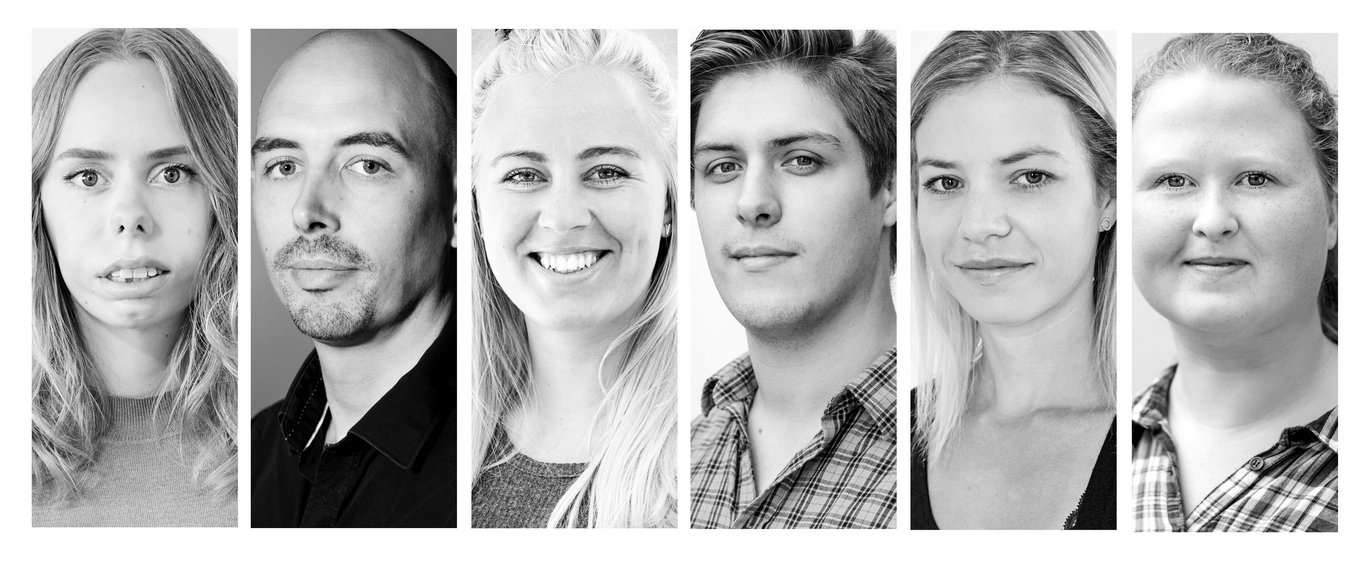
- Stefan has Asperger syndrome: Are you a bit like Rainman?
- Helene suffers from anorexia: "The last time I was in the cafeteria was two years ago"
- Helene has muscular dystrophy "Being disabled is such a downer"
- Mads suffers from schizophrenia "I don’t want to be pigeonholed"
- Janni suffers from depression: Graduates on time thanks to support
- Mette is dyslexic: ”First discovered I was dyslexic when I began at university”
READ MORE: More students apply for support due to psychological disorders
Are you bit like Rainman?
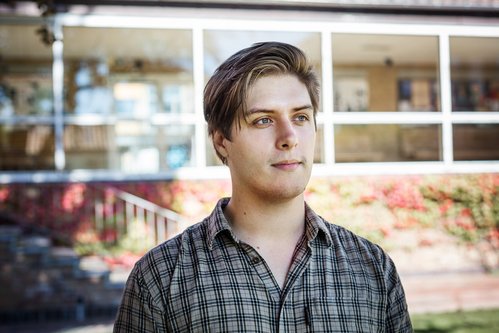
Photo: Maria Randima
Stefan Jensen, 21, fifth semester Computer Science student with Asperger syndrome (an Autism Spectrum Disorder)
Help and support for students with disabilities Help and support for students with disabilities
SPS at Aarhus University helps students with disabilities to apply for special educational support (SPS). This help focuses on supporting the students in overcoming the study difficulties that result from their disability or disorder.
You can get special educational support, if you have:
- Reading and writing difficulties or difficulty with numbers and mathematic (dyslexia and dyscalculia)
- A psychological disorder
- A neurological disorder
- A physical disorder, for example visual or hearing impairments or injuries to the back, shoulders or arms.
Students who are granted special educational support due to dyslexia or psychological/neurological disorders, receive their support schemes via AU's own Counselling and Support Centre (RSC).
RSC has fifteen years of experience of providing support schemes for university students with dyslexia and psychological difficulties. Support is dependent on the student’s disorder or impairment.
Support could comprise e.g. mentorship, counselling, IT aids, ergonomic furniture or accessories, or other special study materials such as audio books.
How do I apply for support?
Contact SPS at Aarhus University, you can find them at Fredrik Nielsens Vej 5, Building 1445/1448.
You can find the Counselling and Support Centre in the same building.
Telephone: (+45) 8716 2730; Mon - Thu 9:00 - 12:00 and 13:00 -15:00, Fri 9:00 - 12:00
Email: sps@au.dk
Find out more at: http://studerende.au.dk/su/
How long have you had Asperger syndrome?
"In principle all my life. My parents have always been aware that there was something with me. I was diagnosed when I was eight."
How does Asperger's manifest itself?
"I have problems socialising and I have a feeling of loneliness, because I think in a different way to others. My senses are very sensitive. And it takes a lot to keep me calm when I receive many sensory impressions. Just getting the bus from home to the university, which takes an hour, can make me feel exhausted. I’ve learned some techniques which help me to stay calm. For example, I need to have a plan for what’s going to happen, and also for what could happen. I think everything through, which is very exhausting."
How does it affect on your studies and student life?
"It affects how much time I can spend at the university. I have to constantly consider whether I get enough out of a lecture compared to what it costs me to catch the bus to the university, be together with a lot of people, be exposed to noise and still have the strength to catch the bus home again. An assignment or group work that means I have to work together with others a lot can simply take a whole week out of my life. The social aspect of studying is also a challenge for me."
What help and support have you received in relation to completing your studies despite Asperger’s?
"I have regular meetings with a contact person from SPS. I talk to her about my challenges, and she comes with ideas about how I can solve them. I also had a student who was further on the programme as a mentor. He helps with the academic aspects such as assignments and is a kind of replacement for a study group. It’s difficult for me to reach out to others in my class because I’m afraid they’ll think that I’m lazy or haven’t read the syllabus. And it’s hard for me to break through that kind of doubt every time. So having a mentor who can help me with academic questions is a relief."
Have you told your fellow students that you have Asperger Syndrome?
"Most of my fellow students know. I tell people if I think it’s relevant for them to know why I don’t come to lectures or group work. I also tell my student teacher if I can’t deliver an assignment or similar. But I haven’t said it to my lecturers."
How did they react?
"I get a lot of pleasure if people are surprised when they hear it. People typically react by showing interest based on the knowledge they have about Asperger's or autism from films and series. I often get asked whether I’m like Rainman. Whether I’m extremely clever or have an awesome memory. Or whether I avoid stepping on the lines in the pavement."
What’s your answer?
"I’m quick to understand new concepts, if I’m composed enough – or if I’m pressured into it. Not everyone with Asperger's is like that. But I think that’s crucial for me being able to deal with the degree programme. Because it’s such a big help for me to be able to understand things quickly, as I otherwise have to use so much energy just going to lectures or whatever."
Have you thought about your career prospects once you graduate?
"I have thought a lot about work environment. Will I end up working somewhere where you sit together with a lot of other people, or will it be possible to work from home?"
What is your dream job?
"I’d like to do something creative, produce games or help to develop an interesting app or a program that will make a difference for the people who use it. I hope I can find something to challenge me, where I can cope with the environment."
"The last time I was in the cafeteria was two years ago"
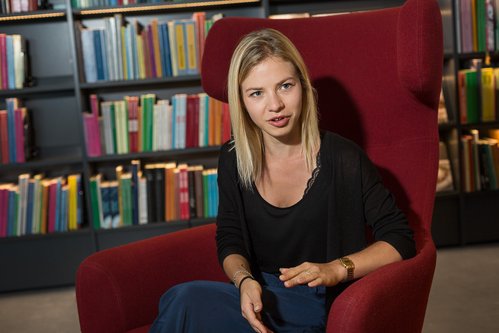
Photo: Maria Randima
Helene Stephansen, 28, third semester MA student of Journalism at AU/DMJX and anorexia sufferer
How long have you had anorexia?
"I’ve had it since I was eleven, but I was diagnosed and admitted to hospital as a 14-year-old. It showed itself when I began to isolate myself and become introvert. I was also often ill and had stomach pains. I've never really thought that being thin looked good, but it became a fascination for me and a way to stand out from the crowd. I was very relieved when the doctor said I had anorexia. I was relieved to be recognised and that someone was doing something. But at the same time that’s when the hard work began to overcome the denial and accept I was ill."
How does the disorder show itself?
"In upper secondary school I had a period that was good where I made friends and went out. But once I finished things went downhill again. I lost a lot of weight and ended up weighing 26 kilos and admitting myself to hospital. I wasn’t thinking clearly because I had lost so much weight. My life was characterised by uncertainty with a new boyfriend, new education, work and travel. There were a lot of things to deal with, so I went back to the bad old ways. I feel much better today, but my relationship with food still demands my energy and focus. I follow a diet plan, which means that I don’t go off on a tangent and fall back into my old pattern. But it’s difficult for me depart from it. For example, if I’m out eating at a restaurant my brain spends the whole evening calculating and thinking about how my diet plan will be ruined. I also suffer from osteoporosis as a result of the anorexia."
How does anorexia impact your studies and your student life?
"I don't have much extra energy and I focus my energy on the degree programme. For this reason I’ve extended my degree programme so I also have the energy to socialise and work a little in a study job to get some experience. Having that opportunity has really given me a sense of calm. The social aspect is difficult for me, things like Christmas parties that involve food and many people. I don’t talk to very many people in my leisure time."
What help and support have you received in relation to completing your studies despite anorexia?
"I took my Bachelor at the University of Copenhagen in Aalborg. Their counselling and support was in Copenhagen, which was inconvenient, and I had to be very proactive to get help. Here at AU everything is more automatic and the system works better. My experience was that I was taken seriously and that it was OK to get help because I have a reason for it. I meet with an adviser every other week or so and I can apply for dispensation from exams and group work if I and my adviser assess that there’s a need for it. It gives me a sense of calm and helps me avoid going back to old patterns when I'm under pressure. That’s why I’ve been able to progress through my degree programme."
Do your fellow students and lecturers know that you have anorexia?
"In the past I didn’t tell my fellow students. I convinced myself to shut it out. I want to be as normal as possible and don’t want to be pigeonholed as ‘the anorexic’. Now it’s just the opposite! I really want people to know so I can share my experiences and help others. I’ve also told individual lecturers, for example when I needed to be exempted from group work, and they’ve been really good and accepted it and been very understanding. I feel better and being able to manage my studies gives me a boost, which again gives me self-confidence in other areas. But I can still find myself in situations where I shake and sweat. I find my extra energy disappears at times when the degree programme is very demanding and that affects the social aspect. It’s often in situations that have to do with food, or where there are many people. For the same reason I avoid the cafeteria. in fact, the last time I was in the cafeteria was two years ago. When I have a sense of calm about my studies, I also have the same feeling about normal things like eating and socialising."
Will your anorexia affect your future opportunities after graduation?
"No, I don't think so, because I’m at the point where I’m now living a normal life. I see it as an experience. And I live with the consequences."
What do you dream of doing?
"I would like to work in the music business. I’d like to write my Master's thesis, and really also a PhD, on music journalism and music streaming. I’d also like to work as a communications officer for a festival or a record label I finish studying."
“Being disabled is such a downer”
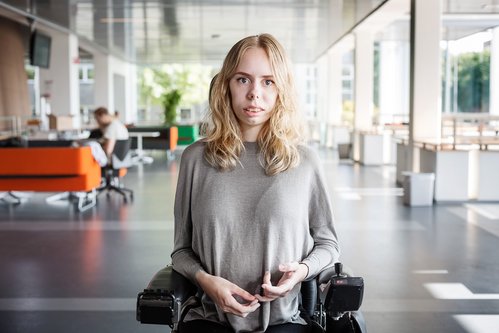
Photo: Maria Randima
Helene Bagge Grimstrup, 23, third semester Media Studies student with muscular dystrophy
How long have you had muscular dystrophy and when were you diagnosed?
"I’ve had it all my life, but I was diagnosed when I was ten. At that time, I didn't have symptoms for being disabled, but it seemed like I was lazy and always wanting to lie on the sofa, and I was bad at sport. But you could see by my face that I had muscular dystrophy because of a lack of facial expressions, and you can also hear it in the way I speak. When I came into puberty, I became physically disabled and had to change my daily life. I was given what’s now called assistive technology, like an electric scooter. It’s such a downer being 13-years-old. Being disabled at the same time is an even bigger downer.”
How does the disorder show itself?
"I can’t walk anymore. For others that’s the most serious thing, but it’s actually the thing I notice least of all. I’m faster and more mobile after getting my electric wheelchair, and I’m not as afraid of falling as I was. I have a team of helpers working for me and one of them is always nearby. I need help with everything."
How does your muscular dystrophy impact your studies and your student life?
"I need my helpers to make sure everything is in place for me. For example, in a teaching situation, where my helper takes my jacket off and places my computer and water bottle on the table. From there I can take care of myself until I have to move on to the next situation. But apart from that, I don’t notice it much during the lectures. I also have to be very aware that my body is under hard physical stress because of the illness, and that I must therefore avoid becoming too stressed in my daily life. I must be able to let go at any time without thinking: Oh no, now I haven’t read Bourdieu, and I know it’s difficult! It can also be quite difficult for me to get around on campus. Here at Katrinebjerg it’s not a problem, but it can be in the buildings in the University Park. So sometimes I get to lectures very late because I have to spend a lot of time finding disabled access and a route to the auditorium."
What help and support do you receive to get through your studies despite having muscular dystrophy?
"I get 12.5 per cent additional time to write an exam paper. I also receive subsidies to pay my helpers during my study time. All my books and compendiums are electronic to ensure a good sitting position, and so I don’t have to carry heavy books around. Otherwise I study on equal terms with my fellow students and take the degree programme within the prescribed time."
What difference has the help had for you?
"It’s one hundred per cent necessary. It’s the whole basis for me being able to study at the university."
Have you told your fellow students that you have muscular dystrophy?
"Yes, I told them at the beginning of the degree programme. I didn’t make an announcement in front of the class, as I’m a more of a social person who talks to many different people, so that after a while everyone has heard. I also tell people if everyone says their name at the start of a new course or whatever. They’re a lot of things that I need to play down, because people are not used to disabled people. I have to answer a lot of questions, and I must answer seriously every time."
How do people react to it?
"People here at the university want it to function, and the lecturers haven’t really treated me any differently than the other students. It’s been a quite an experience as I’ve rarely begun somewhere where fitting-in as a disabled person has been so easy. Here I am in a world that is all about intelligence, and where I’m very average, and I’m really, really happy that I’m here."
How will the fact that you have muscular dystrophy affect your opportunities after graduation?
"I choose to believe that people can see through it. I believe that I'm just as attractive an employee as my fellow students. But it will probably be a flex job or freelance work. I would like to work in journalism or media and here I think it may be an advantage to stand out from the crowd. That’s not to say I think being disabled is cool. I don’t. It’s a real downer of a condition. But it’s a condition, and I just need to turn it into something positive. Accepting it is an active and ongoing process. It takes a lot of energy and focus, but not all of it. Plus the significance of my disability changes all the time as I get older."
"I don’t want to be pigeonholed"
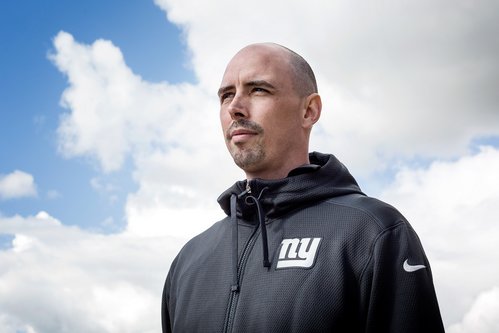
Photo: Maria Randima
Mads Lildholdt Brok, 29, third semester Scandinavian Studies student suffering from schizophrenia
How long have you had schizophrenia?
"I was diagnosed in 2007, but I’ve had symptoms in the form of a psychological discomfort since I was ten or twelve. It culminated towards the end of upper secondary school, when I admitted for the first time that I was hearing voices. I worked at a petrol station, where I experienced that the tabloids on the shelves started talking to me."
How does the disorder show itself?
"I hear voices and I constantly experience a form of psychological discomfort which is difficult to describe. It’s like a feeling of discomfort in my stomach and my head that tires me out and can inhibit my concentration. But while I was very affected by it in the years after being diagnosed, today I’ve come a long way in my recovery process, as can be seen by the fact that I now study at the university under normal conditions."
How does schizophrenia impact on your studies and your student life?
"I find it difficult to concentrate when I need to study and I have to force myself to study. I’m very tired and can sleep up to twelve hours a day. But having a purpose really helps me. Something I have to do. Learning things and socialising at the degree programme makes me a better person. I find it hardest up to exams, where my nervousness can be very intense if I don’t think the right thoughts. I can also suffer anxiety if I have to speak in front of my class or other large gatherings. But I'm doing well now and I’ve learned to handle the illness, among other things by thinking positively, so it doesn’t affect my studies as much as it did back in upper secondary school."
Describe a situation in which you were particularly affected by schizophrenia
"When I read, the voices are particularly clear and it's as if they are doing the reading and not me. I still have control of the situation, but I don’t have a physical sense of manufacturing pictures and thoughts in my head."
What help and support have you received in relation to completing your degree programme despite the schizophrenia?
"I got a mentor through SPS last year, and I’ll get a new one again this year. But I haven’t otherwise received any help, and I study on an equal footing with the other students."
How has having a mentor made a difference?
"He has been good to talk to me and calm me down if I’ve been nervous before exams. He has also proofread my assignments and I’ve used him to practice presentations. That’s been a really good form of support and has given me a smoother way into life at the university."
Have you told your fellow students that you have schizophrenia?
"I want to be open about it, also to help demystify and make it less taboo. On the other hand, it’s a bit difficult to just announce it. I would really like to avoid being pigeonholed and having people think I’m some kind of crazy axe murderer! I told my study group as we had to analyse the novel William by Jan Sonnergaard, in which the main character is possibly schizophrenic."
How did they react?
"They were actually pretty cool about it. Some of them said they would never have guessed if I hadn’t told them. I was really pleased to hear that. They’ve been more considerate than judgmental."
Will the illness affect your opportunities after graduation?
"It will always be something that I have to live with. I take things one day at a time and don’t look years into the future. In relation to future jobs, I think there must be jobs where my history is a positive thing, and where an employer sees the positive in my development rather than just focusing on an old diagnosis."
What do you dream of achieving with your education?
"To me, it's the personal development from specialising in a field. The fact that I even study at the university is in itself a great achievement for me. I’ve come a long way. I hope there’s a job out there that I can do. I really want to give something back to society, which has, together with my friends, girlfriend and family, helped me get to where I am now."
Graduates on time thanks to support
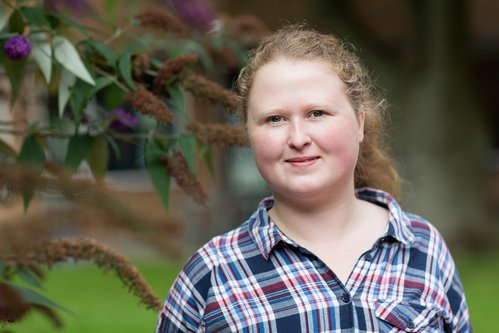
Photo: Lars Kruse
Janni Christensen, 24, third semester International Business student suffering from depression
How long have you suffered from depression?
"I was diagnosed with at the end of the first semester of the Bachelor. But I was suffering from depression already when I started the degree programme, and there were also teachers in upper secondary school who asked whether anything was wrong."
How does the depression show itself?
"I feel uneasy and have difficulty concentrating, I’m very tired and can sometimes sleep up to 15 hours a day. I find it difficult to find an everyday rhythm and can have a bleak view of the world. I’ve also had low self-esteem and I withdraw from social contexts. However, I’m no longer so affected by the depression, but the social aspect is still difficult."
How does depression impact on your studies and your student life?
"Before I got help from the Educational Counselling Team, I was a very inactive student. I didn’t attend lectures very often and found all sorts of excuses for not coming. I had enormous social anxiety and was afraid that I wasn’t good enough academically. After getting help to overcome the cause of the problems, as well as tools to tackle it, depression does not affect my everyday so much anymore."
What help and support have you received in relation to completing your studies despite suffering from depression?
"I was referred to an educational counsellor who I saw regularly. I also had a student who was further on the programme as a mentor. And I was given a dictaphone so I could record the lectures. I can’t concentrate for very long at a time, so it’s a challenge with two or three hour lectures. But now I can record them and listen to them at home. I also have the option of a specific placement for written exams, either at the back of the room or together with other students who also have special needs."
How do your mentor and educational counsellor help you?
"My mentor has helped me a lot academically. It’s a forum where I can ask those ‘stupid questions’. She also helps me to divide my syllabus into smaller parcels to give me a better overview. My educational counsellor has helped me with study techniques, note-taking techniques and with allocating and prioritising my time, among other things in relation to the which lectures are most important to attend. She helps pick me up again if things don’t go that well. She can also give me a verbal going over if that’s what is needed! I think the things that I learn from my mentor and educational counsellor are the same things that other students learn for themselves during the first semesters. I'm just learning them now."
What difference has having help and support made for you?
"My marks have been improving. I was in trouble at the beginning, but now I get marks between 4-12 for my exams and make my way through the degree programme within the prescribed time."
Have you told your fellow students that you suffer from depression?
"Yes, I told my class just after I was diagnosed, even though I haven’t yet fully acknowledged it. But it also helped explain why I’d been absent so much."
How did they react?
"Their reactions varied a lot. Some didn’t have the guts to talk about it and were quite awkward about the whole thing, while others were genuinely interested and asked questions or were really chilled. Here on the Master’s programme there aren’t many who know about it as it doesn’t take affect me so much anymore. I tell the lecturers about it when I need to record the lectures and they’re fine about it.”
Will the illness affect your opportunities after graduation?
"I do worry that the decisions I’ve made during my degree programme will have an impact on my future prospects. For example, I chose not to focus on good marks at the beginning of my degree programme, and I chose not to find a student job and internship. On the other hand, I’ve got life experiences that many of my fellow students don’t have, I know my weaknesses and the battles that I have to fight."
What do you dream of achieving with your education?
"I would like to work in HR."
"First discovered I was dyslexic when I began at university”
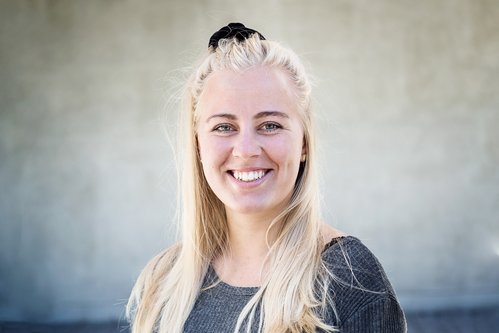
Photo: Maria Randima
Mette Møller, 23, seventh semester (Master’s) Psychology student and dyslexic
When did you discover that you were dyslexic?
"I first found out during the first semester at psychology. It was a big surprise for me, because I’d always done well in school and upper secondary school. My student teacher had read my mock exam and felt that I should check whether I was dyslexic. At first I was really upset because I thought it was because my exam paper was bad. But I went over to SPS (Special Educational Support Team, ed.) anyway and took the test. It showed that I’m dyslexic. That gave me something to think about, but it made sense. I’d been really frustrated throughout the first semester because I read much slower than my fellow students. So it was nice to get an explanation."
How does dyslexia show itself?
"I find it difficult to hear a sound and associate it with a letter – what’s known as the phonemic principle. It’s particularly obvious when I have to spell words I don't know, or English words. I simply have no idea how they should be spelled. Everyday Danish words aren’t a problem because I can remember how to spell them. But English is difficult, and 80-90 per cent of our degree programme texts are in English."
How does your dyslexia impact on your studies and your student life?
"I read slower than my fellow students, so I spend many hours reading the syllabus. This means that I don’t have very much time for a study job, voluntary work or to take part in party committees on top of my studies. That was something that I had to learn to accept, particularly because it’s very important to have some things on your CV here at psychology."
Have you told your fellow students that you are dyslectic?
"Yes, I chose to announce to my class that I’d taken a test which showed I was dyslexic. I also told my student teacher that I was happy that she had encouraged me to take the test."
How did they react to it?
"I don't think they think about it. I had speculated about whether people would feel like having me in a study group, but that’s not been an issue at all. I'm just not the person who gets asked to take notes."
What help and support have you received?
"During the first and the second semesters I had fortnightly appointments with a counsellor, where we focused on reading techniques. I learned to be selective with my reading and to browse chapters, so I could make it unscathed through a difficult course. I have continued using these techniques ever since. In addition, I’ve also got some IT programs that can read texts aloud, and others which act like an intelligent dictionary in Word. I’ve also been given access to a website with audio books. And I have the opportunity to apply for an exemption for exams so I can get twenty per cent longer for my assignments."
How has it made a difference?
"It has given me peace of mind and comfort. Studying is challenging when you’re dyslexic, but you can find support and help. I’ve found that being dyslexic isn’t a barrier to studying, and that there are people who can help me get through it. That was amazingly encouraging!"
Will your dyslexia affect your opportunities after graduation?
"My view is that it shouldn’t be a barrier to becoming what I want to be or achieving what I’m striving for. I don’t see it as a weakness. I see it as a sign of strength that I'm taking a long academic education, despite being dyslexic. It shows that I don’t give up when facing a challenge. That’s also how I hope an employer will look at it."
What do you dream of achieving with your education?
"I want to work as a psychologist, preferably with children and young people. For example, in the collaboration between school and home or psychological counselling services."
Translated by Peter Lambourne

